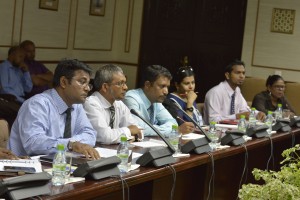The first official trade talks between the Maldives and US governments took place this morning at the Ministry of Foreign Affairs in Malé.
The meeting was the first bilateral discussion since the signing of the Trade and Investment Framework Agreement (TIFA) in 2009 to provide a forum in which bilateral talks can proceed.
“The first meeting discussed procedures for more robust engagement, as well as touched on topics such as labor, intellectual property, and the investment climate,” said the US following this morning’s meeting.
Minister of Economic Development Mohamed Saeed told the US delegation at today’s meetings of the government’s plans to diversify the economy away from its reliance on tourism, as well as the recent changes to the investment climate with the Special Economic Zones Act.
He also noted that further changes to legislation were planned that would ease foreign investment. The US State Department has previously noted that “the ambiguity of codified law acts as a damper to new investment” in the Maldives.
Despite the council not having met before today, total trade between the two countries has more than doubled between 2009 and 2013. Saeed told press today that the Maldives’ major export to the US was fish products, expressing his hope that Maldivian fishermen could take advantage of marketing opportunities within the US.
Speaking at a press conference after today’s meeting, Saeed said the government had plans to more than triple the current amount of fish exports to the US by 2018.
Part of the initial agreement, signed five years ago, stated that both parties would endeavour to hold talks at least once a year. The United States-Maldives Council on Trade and Investment – established by the TIFA – is designed to monitor trade flows, investigate new opportunities, and remove impediments to further investment.
Economic development minister Saeed represented the Maldives alongside State Minister for Economic Development Faris Maumoon, while the US delegation was led by Assistant Trade Representative for South Asia Michael Delaney along with Deputy Chief of Mission at the US Embassy in Colombo Andrew Mann.
“Our team comes from multiple U.S. government agencies and has been looking forward to returning to the Maldives to learn more about both the trade and investment conditions and the labor environment,” said Delaney in a press release from the Colombo embassy.
The press release noted that the US has TIFA agreements with almost 50 countries in every region of the world.
(SOURCE: U.S. Census Bureau, Foreign Trade)
Not traditionally a key contributor to the Maldives’ billion dollar tourism industry, US visitors represented less than 2 percent of the market share in 2013.
US engagement with the Maldives has traditionally concerned foreign assistance to enhance maritime security, counter terrorism, and counter narcotics cooperation with Maldivian forces.
Officers and crew from the USS Rodney M Davis visited the Maldives earlier this month, with Vice Admiral Robert Thomas noting the critical nature of the Indian Ocean to regional security.
Rumours of a Status of Forces Agreement – opening up the possibility of US forces being stationed in the Maldives – surfaced in 2013, before incoming President Abdulla Yameen announced that any such deal would be likely to damage relations with neighbouring countries.
The US has also pledged to help the Maldives adapt to the negative effects of global climate change, pledging US$7.2 million (MVR111 million) for a global climate change adaptation project last year.
2013 also saw US private equity firm Blackstone acquire both the Maldives’ major seaplane operators for an undisclosed sum, as well as the introduction of the US designed PISCES border control system.
The PISCES system was utilised in the controversial arrest of alleged Russian hacker Roman Seleznyov by US security personnel while in the Maldives in July. Seleznyov was subsequently transported to the US via Guam where he awaits trial.
 (0)Dislikes
(0)Dislikes (0)
(0)
